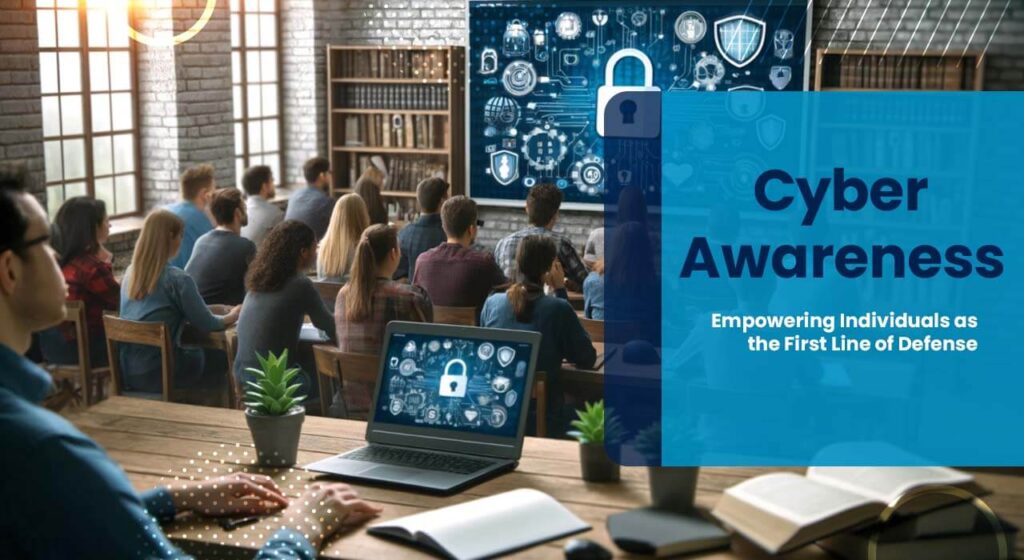
Why You Are the Key to Online Security
The digital revolution has undeniably transformed our lives, weaving itself into the fabric of our personal and professional spheres. However, this interconnectedness comes with a hidden adversary – cybercrime. From financial scams and data breaches to identity theft and malware attacks, the online landscape is riddled with ever-evolving threats. In this dynamic environment, fostering cyber awareness and empowering individuals as the first line of defense is paramount. By cultivating a proactive and informed approach to cybersecurity, we can collectively build a more resilient digital ecosystem.
The Expanding Threat Landscape
The exponential growth of technology and the ubiquitous presence of the internet have undoubtedly yielded immense benefits. Yet, this very connectivity has created fertile ground for cybercriminals to exploit vulnerabilities. Phishing emails designed to steal personal information, ransomware that cripples computer systems, and social engineering tactics that manipulate human trust – these are just a few examples of the increasingly sophisticated threats individuals and organizations face. To effectively combat these adversaries, we must cultivate a culture of cyber vigilance, where individuals are equipped with the knowledge and tools to safeguard their digital lives.
Empowering Individuals: The First Line of Defense
Cyber awareness refers to the ability to identify and understand potential cyber threats, coupled with the knowledge of best practices to mitigate them. By promoting cyber awareness, we empower individuals to become active participants in their own online security. Imagine a security guard for your digital life – cyber awareness equips you with the skills to recognize suspicious activity, implement preventative measures, and respond effectively to potential threats. This proactive approach shifts the paradigm from solely relying on technological safeguards to fostering a security-conscious mindset.
Equipping Individuals for the Digital Age
Education and training are the cornerstones of building a cyber-aware society. Accessible and comprehensive resources covering various aspects of cybersecurity are crucial. These resources should encompass topics like common online threats, safe browsing practices, creating strong and unique passwords, and recognizing social engineering techniques. Governments, educational institutions, and private organizations can all play a vital role in developing and delivering engaging cybersecurity awareness programs, workshops, and online courses. These initiatives should cater to individuals of all ages and backgrounds, promoting a lifelong learning approach to cybersecurity.
Secure Habits: Building a Digital Defense
While technology plays a significant role in online security, fostering secure habits and adhering to best practices are equally important. Think of it as digital hygiene – essential for maintaining a healthy online presence. Regular software updates, strong and unique passwords (avoid birthdays and pet names!), multi-factor authentication, and cautious interaction with suspicious emails, links, and attachments are all fundamental practices. Additionally, emphasizing the importance of privacy settings on social media platforms and promoting responsible online behavior are crucial components of cyber awareness.
Building a Culture of Vigilance
A vigilant society is a secure society. Encouraging individuals to take personal responsibility for their online security and report any suspicious activity is key. Establishing clear channels for reporting incidents and providing accessible guidelines on how to respond to potential breaches are crucial steps in facilitating the swift identification and resolution of cyber threats. Furthermore, fostering open communication and collaboration within organizations and communities can significantly enhance collective cybersecurity efforts.
A United Front Against Cybercrime
Cybersecurity is a shared responsibility. By working together, individuals, organizations, and governments can create a more secure digital landscape. Collaborative efforts can involve pooling resources, sharing information, and developing proactive strategies to combat cyber threats. Public-private partnerships can leverage the expertise of both sectors to raise awareness, educate the public, and effectively protect individuals and organizations from cyber risks.
As the digital landscape continues to evolve, cyber awareness becomes an increasingly valuable asset in safeguarding our online security. By empowering individuals as the first line of defense, we can build a more resilient digital ecosystem that mitigates risks and thwarts cyber threats. Through education, training, secure habits, and collaboration, we can navigate the digital age with confidence, fostering a cyber-aware society where individuals are empowered to protect themselves.
For Businesses: Take Your Security a Step Further
While individual awareness is crucial, building a robust cybersecurity posture requires a multi-layered approach. Businesses have a particular responsibility to protect sensitive data. If you’re an entrepreneur or run a business, fortify your defenses with Identity and Access Management (IAM) solutions. Learn how to identify vulnerabilities and implement strong IAM practices in our informative blog post: Australian Businesses Beware: 5 Signs Your Identity Needs an IAM Fix-Up.

